The Government is ‘absolutely’ looking at the idea of introducing a BritCard ID app as it seeks to tackle illegal immigration. a Cabinet minister confirmed today.
Environment Secretary Steve Reed said that ministers ‘know we need to look at all the actions we can take’ to reduce the number of people crossing the Channel in small boats.
The phone app would display a person’s right to live, work and rent in the UK on a smartphone.
And as well as blocking illegal immigrants from working, supporters say it would also tackle benefit fraud through links to government records.
It has already received support from several cabinet ministers, including cabinet office minister Pat McFadden and technology secretary Peter Kyle.
And today Mr Reed told Times Radio on Friday morning, Mr Reed said: ‘It’s absolutely something that we are looking at, and that we should be looking at.’
He added: ‘We know we need to look at all the actions we can take to stop the levels of illegal migration that we were seeing particularly under the last government.
‘We have to stop the number of people that we’ve seen who don’t have a right to come here.’
But Rebecca Vincent, interim director of Big Brother Watch, said: ‘Make no mistake: the new digital ID proposal reportedly being considered by the Government is another plan for a mandatory universal ID under a new guise.
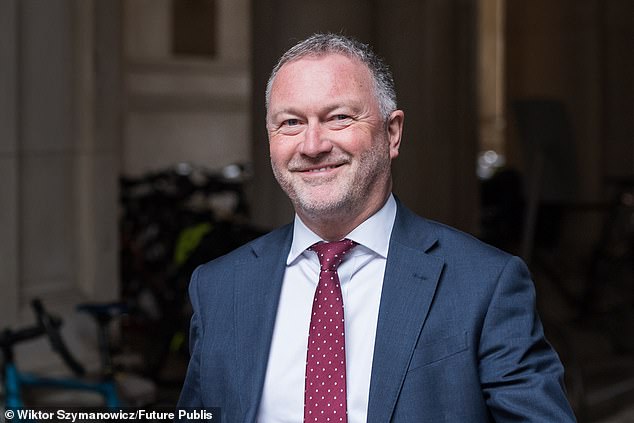
Environment Secretary Steve Reed said that ministers ‘know we need to look at all the actions we can take’ to reduce the number of people crossing the Channel in small boats.
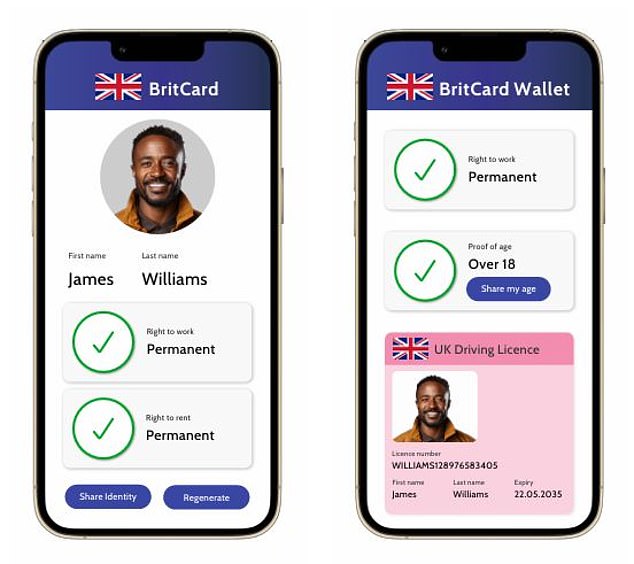
Downing Street is looking to bring in an identity card app, known as BritCard, pictured, in a bid to clamp down on illegal immigration

Advocates think the scheme will send the message that Britain is not ‘a soft touch’ on illegal migration (pictured: migrants in the Channel on a small boat this year)
The so-called ”BritCard” would fundamentally change everyone’s relationship with the state, moving us towards a ‘papers please’ society and putting a burden on all law-abiding people to prove our right to be here.
‘This would mark a severe departure from Britain’s long and proud history of resisting mandatory ID.’
Asked whether he thought digital IDs should be mandatory, Mr Reed said: ‘There’s a discussion going on and I’m happy to take part in that discussion as well.
Advocates think the scheme will send the message that Britain is not ‘a soft touch’ on illegal migration and will decrease the ‘pull’ factor, which many European countries blame for the ongoing small boats crisis.
Britain remains the only European nation without an ID card system, with Tony Blair‘s famous attempt to introduce one collapsing in 2011, after the coalition government pulled the plug on it.
It is also hoped the app can tie a number of different services together, including ordering passports, displaying driving licences and national insurance numbers, and offering NHS services.
Labour Together, a think tank run by Sir Keir Starmer’s chief of staff, Morgan McSweeney, from 2017 to 2020, has collated plans for the card and sent them to Downing Street.
They include a requirement to ‘show’ the ID when renting a property or starting a new job, with the system automatically checking their right to work or rent against government records.
Existing documents to check identity can be easily forged, potentially deceiving landlords or prospective employers.
A mock up of the app, seen in the plans, shows a screen with an individuals’ face and name on it, as well as his right to work and rent statuses, driving licence, and options to share identity or age.
The report, published on Friday, urges the Prime Minister to make digital identity a ‘top prime ministerial priority’ and commence a ‘fundamental transformation in the way British citizens interact with the government’.
It points to a poll which suggests 80 per cent of the public back the implementation of digital right-to-work credentials, with just under one in three believing it would act as a deterrent against people entering the country illegally.
The report said that those who did not want to have a digital ID card on their phone would be allowed to carry a physical one instead.
Home Secretary Yvette Cooper has placed herself in opposition to some of her colleagues, including many from the ‘Red Wall’ wave of Labour MPs, with Home Office sources describing her position as ‘nuanced’.
Sir Keir Starmer has admitted the public has ‘every right to be angry’ about the issue after more than a thousand migrants made the journey in a single day for the first time this year.
Home Office data showed 1,194 migrants arrived in 18 boats on Saturday.
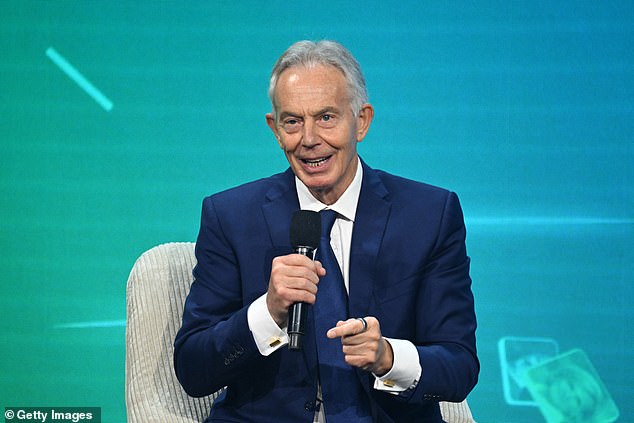
Britain remains the only European nation without an ID card system, with Tony Blair ‘s famous attempt to introduce one collapsing in 2011, after the coalition government pulled the plug on it.
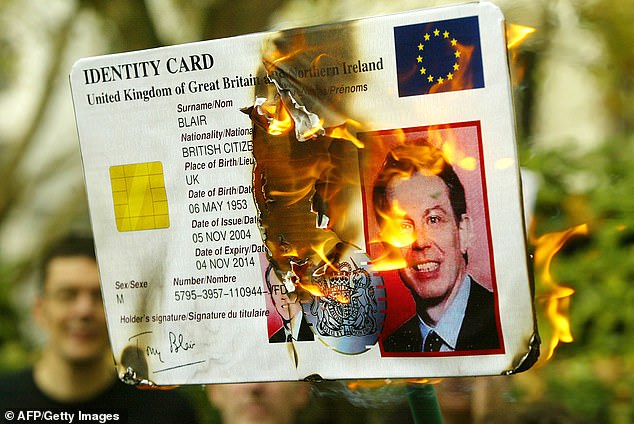
Britain remains the only European nation without an ID card system, with Tony Blair’s famous attempt to introduce one collapsing in 2011 (pictured: protests against the scheme in 2004)

The idea has received support from several cabinet ministers, including cabinet office minister Pat McFadden, pictured in May
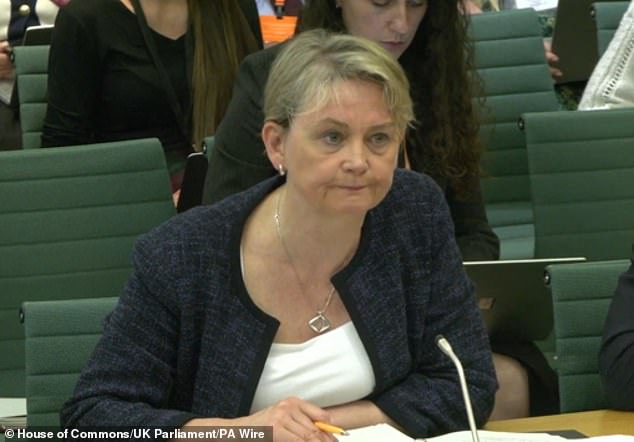
Home Secretary Yvette Cooper , pictured in May, has placed herself in opposition to some of her colleagues, including many from the ‘Red Wall’ wave of Labour MPs
But Conservative leader Kemi Badenoch described Sir Keir’s words as ‘rubbish’, claiming that even Defence Secretary John Healey had acknowledged ministers had ‘lost control’ of the borders.
Saturday’s figures were the first time daily crossings topped a thousand in 2025, and prompted Mr Healey to claim Britain had ‘lost control’ over the last five years, implicating the former Tory government.
Writing on social media site X on Monday, the Prime Minister said: ‘You have every right to be angry about small boat crossings.
‘I’m angry too. We are ramping up our efforts to smash the people smuggling gangs at source.’
He claimed hundreds of boats and engines had been ‘seized’, raids on illegal working were up, and ‘almost 30,000 people’ had been returned.
But Mrs Badenoch hit back, responding: ‘Rubbish! Even the Defence Secretary admits the govt has ‘lost control’ of our borders.’
Small boat arrivals are ‘up 95% from this point in 2023’, she said, and claimed ministers had ‘scrapped the only viable deterrent’: the previous Conservative government’s Rwanda plan.
Sir Keir had earlier insisted the Rwanda plan ‘didn’t deter anybody’, after his decision to scrap it was highlighted while he visited Glasgow for a major defence announcement.
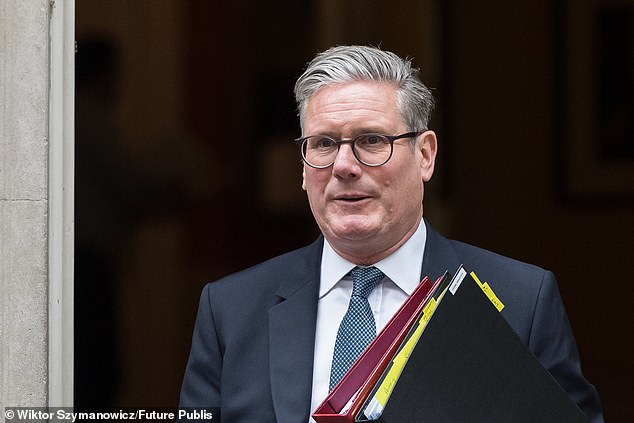
Sir Keir Starmer, pictured on Wednesday, admitted the public has ‘every right to be angry’ about immigration after more than a thousand migrants made the journey in a single day

Saturday’s crossings brought the provisional annual total so far of migrants who have made the journey to 14,811 (pictured: people who are thought to be migrants at Dover in May)
He added: ‘I’m not up for gimmicks. I’m up for the hard work of working with partners, enhancing the powers that law enforcement have, in my determination to take down the gangs that are running this vile trade.’
Saturday’s crossings brought the provisional annual total so far of migrants who have made the journey to 14,811.
This is 42 per cent higher than the same point last year (10,448) and 95% up from the same point in 2023 (7,610).
It is still lower than the highest daily total of 1,305 arrivals since data began in 2018, which was recorded on September 3, 2022.












